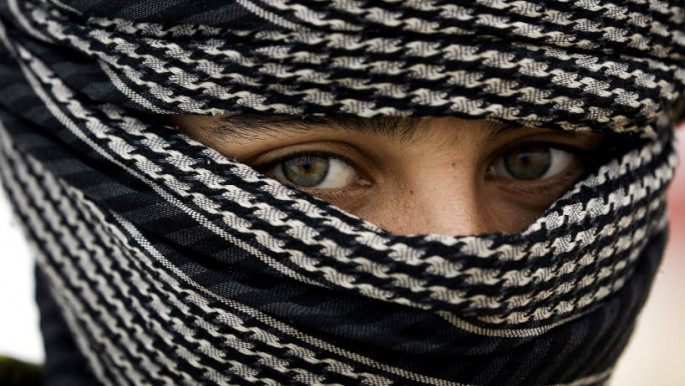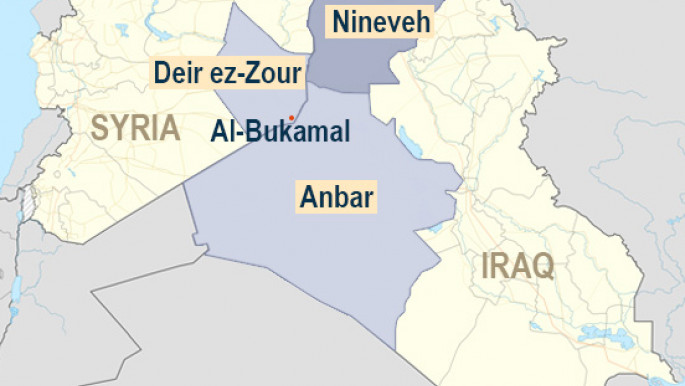Is the Syria-Iraq border still relevant after IS defeats?
Iraq's border with Syria has long been porous. Just days after the US initiated their invasion of Iraq back in 2003 Syrian Islamists flooded across to fight the incoming Americans. The Syrian regime bussed them to the border and gave them discounts on passport fees.
As Syria's President Bashar al-Assad cracked down on peaceful protests at the start of the Syrian uprising in 2011, Iraq was threatened by spillover from the violent instability there.
The Islamic State group, then known as Islamic State of Iraq, managed to attain a foothold amid the chaos.
In early 2013, dozens of Syrian soldiers crossed the international border into Iraq to seek refuge amid clashes. However, it was on Iraqi soil that militants, believed to be al-Qaeda in Iraq, massacred 48 of them using machine guns and rocket-propelled grenades. Nine Iraqi soldiers were also killed in the attack.
Iraqi officials suspected this well-planned attack was coordinated on both sides of the border.
Baghdad denied that allowing entry to the Syrian soldiers amounted to support for the regime in Damascus, claiming they were only permitted entry on humanitarian grounds.
Nevertheless, then Prime Minister Nouri al-Maliki opposed the Sunni Arab-majority Syrian uprising in 2011, at least partially on sectarian grounds.
 |
It wasn't until IS overran Mosul in June 2014, and symbolically dismantled the Sykes-Picot border that demarcated Iraq from Syria, did it receive international attention |  |
In January 2014, IS consolidated its control over the Syrian city of Raqqa, where Syrian rebels claimed control early the previous year. The same month, IS militants captured the war-torn city of Fallujah in Iraq's restive Sunni-majority western Anbar Province.
 |
|
| The rise of the Islamic State group, the fight against it and the brutal violence of the Assad regime have left millions of Syrians displaced [AFP] |
But it wasn't until IS overran Mosul in June 2014, and symbolically dismantled the Sykes-Picot border that demarcated Iraq from Syria, did it receive international attention.
IS began rotating militants it was training between their territories in both countries, a clear attempt to demonstrate to new recruits that the caliphate had supplanted this former frontier. In capturing Mosul, IS claimed American-made Iraqi military equipment left behind by the retreating Iraqi army. They took it to Syria to fight the Kurdish People's Protection Units (YPG) forces there.
When IS infamously launched a genocidal attack on the Yazidi minority in the Sinjar region in northwest Iraq, it was the YPG which established a corridor from Syrian territory to rescue thousands of civilians.
In June 2014, a Syrian jet reportedly carried out an airstrike against IS on the Iraqi side of the border, in Qaim, Anbar Province. Prime Minister Maliki declared there was no coordination involved, but welcomed this action nonetheless.
"We welcome any Syrian strike against [IS], because this group targets both Iraq and Syria," he said. "But we didn't make any request from Syria. They carry out their strikes and we carry out ours. The final winners are our two countries."
Maliki resigned in August 2014 amid a political storm, but remains an influential figure as one of three vice-presidents - despite attempts by his successor, Haider al-Abadi, to abolish the post.
 |
|
When the US stepped up its war against IS it formed a coalition of European and Arab countries to combat the militants.
While the US campaign involved hitting IS in both Iraq and Syria, by September many European nations restricted their airstrikes to Iraqi territory, since they were coordinating operations with Baghdad.
In Damascus, no coalition airstrikes were coordinated with the Assad regime. The coalition still recognised Iraq and Syria as two distinct states, despite IS efforts to destroy them both.
IS has now been forced out of all of Anbar's major cities and the eastern side of Mosul - its last major stronghold in Iraq. It's unclear how successfully Iraq and Syria can patch-up the border after IS is driven from Iraqi territory. There has been intermittent talk in recent months that the Iraqi Shia Hashd al-Shaabi paramilitaries known as the Popular Mobilsation Forces may expand their campaign against IS into eastern Syria.
"If we can be successful against IS and liberate our own soil, we can go into Syria if our brothers there need help against IS," Maliki said in January.
This however, flew against what he had said the previous month: "Talk of the [Popular Mobilisation] fighting in Syria is premature.
"I don't believe that it will happen now, because the situation in Syria at the moment does not require a [PM] intervention."
Nevertheless, Maliki went on to say that: "If we are able to impose security, get rid of [IS] and cleanse our territory of terrorism, it would be reasonable to respond and help Syria face [IS], because the group will come back to Iraq if we don't destroy it completely."
According to Al-Monitor's Ali Mamouri, the US and the incumbent government under Iraqi Prime Minister Haidar al-Abadi want to prevent certain militias within the PMF - particularly those closer to Iran who are "outside the framework of the Iraqi government" - from fighting beyond Iraq's borders.
Most of the paramilitaries are under the command and control of Baghdad and cannot, in theory, be deployed to Syria unless the Iraqi government orders them to do so.
 |
Increased pressure on the militants in their Raqqa stronghold in Syria, for example, is seeing them push more aggressively to capture the provincial capital of Deir Ez-Zour |  |
Mamouri also notes: "There have been indications that the United States would like to give Iraq a role in the fight against IS in the Syrian territories as well."
Iraqi Air Force F-16s bombed IS in Syria for the first time in late February; the US provided them with information for the airstrikes. IS control of Syrian territories near Iraq constitute a threat to Iraq's border regions. Increased pressure on the militants in their Raqqa stronghold in Syria, for example, is seeing them push more aggressively to capture the provincial capital of Deir Ez-Zour in Syria's east.
If they succeed in overrunning the Syrian army garrison in Deir Ezzor airport, they could potentially deploy enough resources to threaten Iraq's large sparsely populated Anbar province - and possibly regain another foothold once more.
This would be a stark precedent, considering Anbar's major cities have been almost totally destroyed by previous offensives to uproot the militants; their inhabitants displaced.
IS attempts to do away with the Iraq-Syria frontier is, perhaps paradoxically, seeing the Iraqis and Syrians themselves partially overlook, for now, the international frontier's relevance in their efforts to defeat these marauding militants.
Paul Iddon is a freelance journalist based in Erbil, Iraqi Kurdistan, who writes about Middle East affairs.
Follow him on Twitter: @pauliddon





 Follow the Middle East's top stories in English at The New Arab on Google News
Follow the Middle East's top stories in English at The New Arab on Google News


